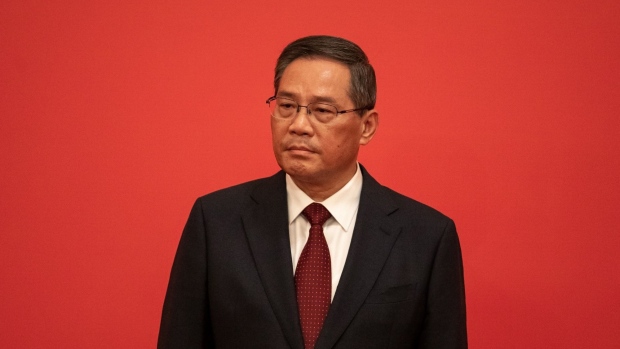Mar 10, 2023
China’s Leadership Takes Shape as Xi Aide Steps Into Premier Job
, Bloomberg News

(Bloomberg) -- President Xi Jinping is completing his shake-up of China’s top personnel this weekend, a task that kicked off when the legislature voted to install a key ally and former aide as premier.
Li Qiang, the former Communist Party boss of Shanghai, has been the front-runner for the job since he was named the party’s No. 2 in October. He was officially nominated to the position at the National People’s Congress on Saturday morning, though a vote formalizing the move had yet to be held.
The appointment at the annual political event comes as Xi — who secured a third term as president on Friday — is cementing his power, with the legislature later filling leadership roles in the finance ministry, the central bank and elsewhere with his associates.
The Chinese president has used the political gathering to revamp the government and better position China to compete with the US. On Tuesday, China unveiled plans to strengthen oversight of its $60 trillion financial system, create a new agency to manage data, and restructure the Ministry of Science and Technology. The military also got another boost in funding.
The event is also about consolidating control under Xi and surrounding him with loyalists. Li Qiang takes the premiership, the leader of the country’s cabinet, at a time when the position has been diminished in direct authority. Still, he’ll also have a much closer relationship to the president than his predecessor.
Li Qiang, who oversaw Shanghai during its punishing, months-long lockdown to curb a virus outbreak last year, was seen chatting with Xi at the NPC on Friday. That exchange provided fresh evidence to theories that the country’s new leadership team shares strong chemistry.
Outgoing Premier Li Keqiang, the country’s first in that role with an economics doctorate, was a one-time rival for China’s top job. Li Qiang, in contrast, was once Xi’s personal secretary. The outgoing and incoming premiers are not related, though they share identical characters in their names.
“With Li Qiang, it’s clear that his function will be to turn Xi’s ambitions and inclinations into a policy agenda, not to provide a publicly contrasting emphasis or perspective,” Christopher Beddor, deputy China research director at Gavekal Dragonomics, said before the NPC voted Saturday.
“That’s likely to mean greater clarity for lower-level officials, but also less wiggle room for interpretation as they implement policy.”
The rest of the leadership team, to be announced Sunday, are likely to be Xi allies, too. He Lifeng — the head of China’s state planning agency who is expected to replace Liu He as the vice premier responsible for economic policy — has also been floated as a contender for party secretary at the People’s Bank of China. If He takes both jobs, it would be the first arrangement of that kind since the 1990s, the Wall Street Journal reported.
The new guard has a pressing job: managing the economic recovery after China started emerging from Covid Zero at the end of last year. While there have been recent signs of a rapid pickup in consumer spending, challenges are rife.
Exports — a key pillar of China’s economic growth over the last two years — are dropping as global demand wanes, with concerns mounting that developed markets could fall into recession. Investment growth has slowed as the real estate sector remains weak. The worsening finances of local authorities may constrain infrastructure spending and handicap that as a growth driver as Beijing remains vigilant about their debt risks.
In what was perhaps an acknowledgment of those uncertainties, China set an economic growth target of around 5% for the year — a figure widely seen as conservative. Still, economists see that goal as achievable, which may help the government retain some credibility after missing 2022’s target by a wide margin.
(Updates with Li Qiang winning vote for premier.)
©2023 Bloomberg L.P.


